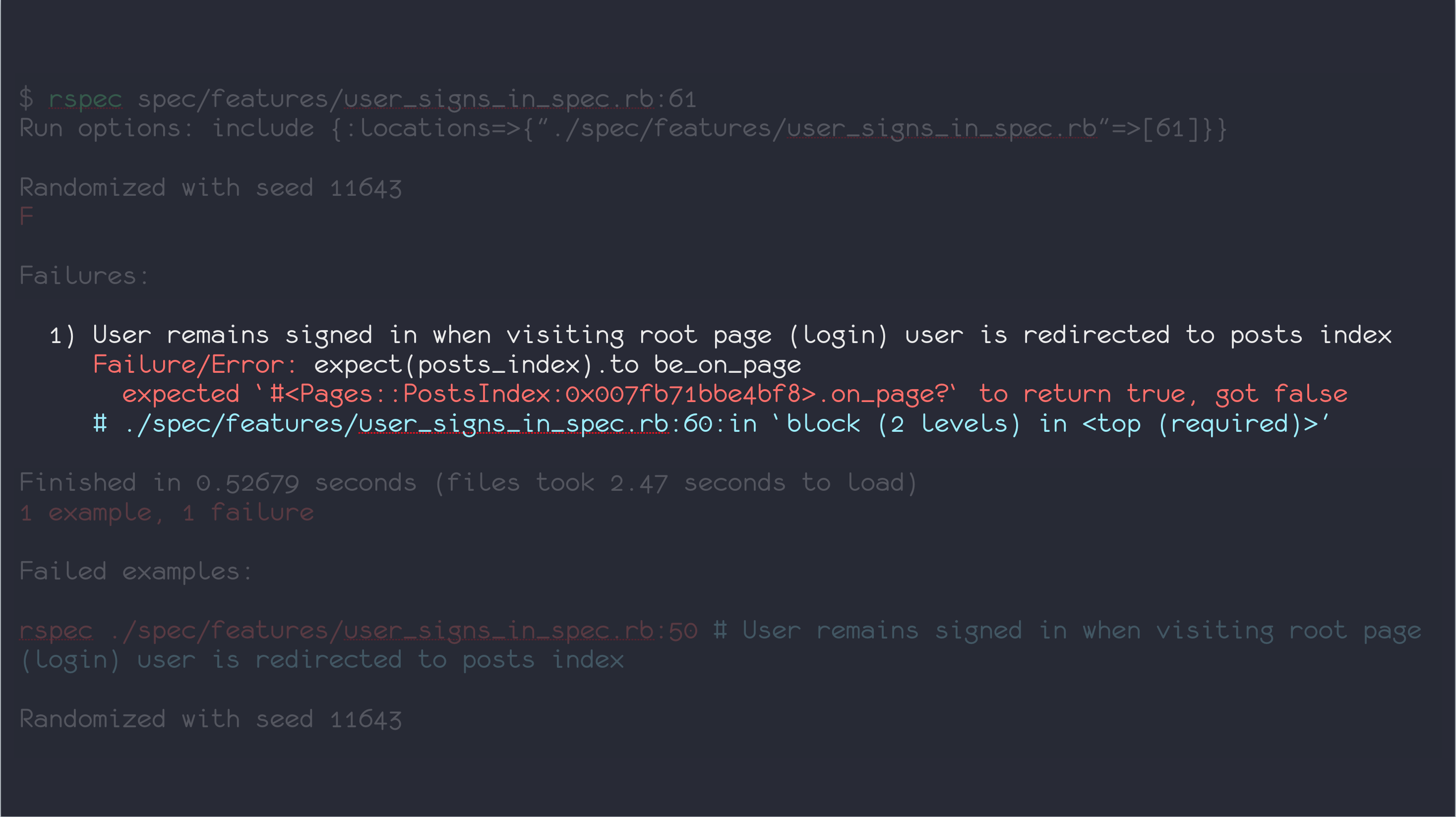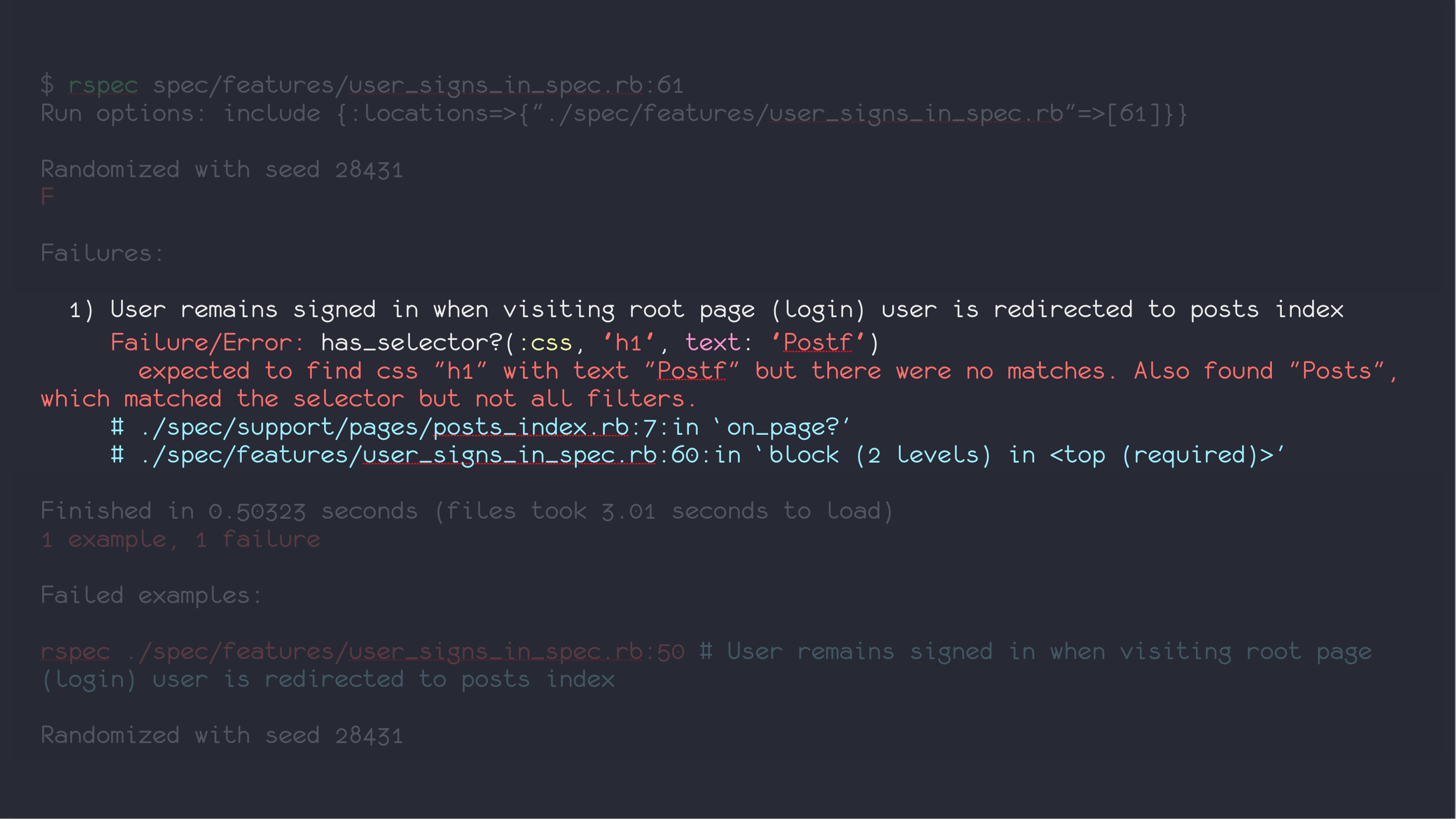Capybara provides excellent error messages for its built in predicate methods: has_selector?, has_text?, has_title? etc., but when those are used from Page Objects while exposing predicate methods from the PageObjects themselves the error messages are lost and all we get is expected true, got false. Including this module into your PageObject by adding include CapybaraErrorIntel::DSL after include Capybara::DSL will return the heuristic error messages.
Add this line to your application's Gemfile:
group :test do
gem 'capybara_error_intel'
endAnd then execute:
$ bundle
Or install it yourself as:
$ gem install capybara_error_intel
Simply include at the top of your PageObject, after include Capybara::DSL.
Then use the built in Capybara::DSL as you are used to.
module Pages
class PostIndex
include Capybara::DSL
include CapybaraErrorIntel::DSL
def on_page?
has_selector?('h1', text: 'Posts')
end
end
endNow this page object can be used in an expressive assertion like so:
feature "User signs in" do
scenario "redirected to posts index after sign in" do
#... do the sign in dance
post_index = Pages::PostIndex.new
expect(post_index).to be_on_page
end
endNote: currently this gem only supports the following Capybara built-in predicate methods:
has_selector?(*args)has_text?(*args)(andhas_content?alias)has_title?(title, options={})has_css?(css, options={})has_button?(locator, options={})has_field?(locator, options={})has_xpath?(xpath, options={})has_checked_field?(locator, options={})has_unchecked_field?(locator, options={})has_select?(locator, options={})has_table?(locator, options={})
It should be rather trivial to add more of them. Please open an issue or submit a pull request if something you need is missing.
If you ever need to access the overwritten Capybara predicate methods you can do
so by using Capybara's page for example:
module Pages
class PostIndex
include Capybara::DSL
include CapybaraErrorIntel::DSL
def has_header?(header_text)
page.has_selector?('h1', text: header_text)
end
end
endThis will allow you to have negative assertions. That being said I strongly
discourage the use of negative assertions, especially with waiting Capybara
methods such as has_selector? since they can make your test suite really slow.
expect(post_index_page).to_not have_header('POSTS')Note: I'm considering changing CapybaraErrorIntel for v2 to expose the predicate methods as bang methods, both positive and negative e.g.
has_selector!andhas_no_selector!. Please share your thoughts in the issues section.
After checking out the repo, run bin/setup to install dependencies. Then, run rake spec to run the tests. You can also run bin/console for an interactive prompt that will allow you to experiment.
To install this gem onto your local machine, run bundle exec rake install. To release a new version, update the version number in version.rb, and then run bundle exec rake release, which will create a git tag for the version, push git commits and tags, and push the .gem file to rubygems.org.
- Add a version header to the top of CHANGELOG.md and list all changes as bullets below the new version number
- Change the version number in
lib/capybara_error_intel/version.rb - In the project's directory run
gem build capybara_error_intel.gemspec - Push the gem to RubyGems
gem push capybara_error_intel-##VERSION##.gem
Bug reports and pull requests are welcome on GitHub at https://github.com/dkarter/capybara_error_intel
Please make sure the test suite passes and that you added tests for any new method implemented.
The gem is available as open source under the terms of the MIT License.


